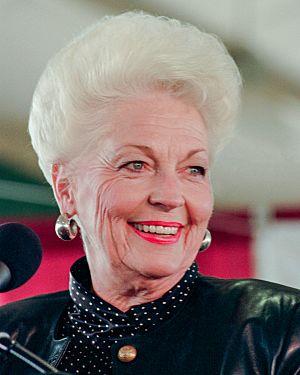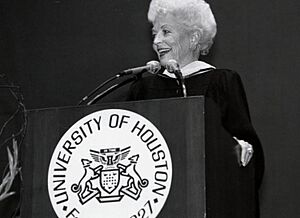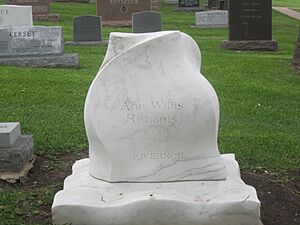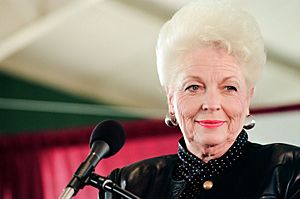Ann Richards facts for kids
Quick facts for kids
Ann Richards
|
|
|---|---|

Richards in 1992
|
|
| 45th Governor of Texas | |
| In office January 15, 1991 – January 17, 1995 |
|
| Lieutenant | Bob Bullock |
| Preceded by | Bill Clements |
| Succeeded by | George W. Bush |
| Treasurer of Texas | |
| In office January 18, 1983 – January 15, 1991 |
|
| Governor | Mark White Bill Clements |
| Preceded by | Warren Harding |
| Succeeded by | Kay Bailey Hutchison |
| Personal details | |
| Born |
Dorothy Ann Willis
September 1, 1933 Lakeview, Texas (now Lacy Lakeview), U.S. |
| Died | September 13, 2006 (aged 73) Austin, Texas, U.S. |
| Resting place | Texas State Cemetery |
| Political party | Democratic |
| Spouse |
Dave Richards
(m. 1953; div. 1984) |
| Children | 4, including Cecile |
| Relatives | Gary Tinterow (first cousin once removed) |
| Education | Baylor University (BA) University of Texas, Austin |
Dorothy Ann Richards (born Willis; September 1, 1933 – September 13, 2006) was an American politician. She served as the 45th governor of Texas from 1991 to 1995. She was a member of the Democratic Party.
Ann Richards first gained national attention as the Texas State Treasurer. She became even more famous when she gave a very memorable speech at the 1988 Democratic National Convention. Richards was the second woman to become governor of Texas. She was known for her strong beliefs about feminism and her funny, quick remarks.
Born in McLennan County, Texas, Richards became a schoolteacher after graduating from Baylor University. She was elected to the Travis County Commissioners' Court in 1976. In 1983, she became the Texas State Treasurer. She gave a speech at the 1984 Democratic Convention. Her keynote address at the 1988 Democratic Convention made her a national figure.
Richards won the 1990 Texas gubernatorial election to become governor. She defeated businessman Clayton Williams in the main election. She was later defeated in the 1994 Texas gubernatorial election by George W. Bush. Ann Richards stayed active in public life until she passed away in 2006.
As of 2023, Richards is the most recent Democrat and woman to serve as Governor of Texas.
Contents
Early Life and Education
Ann Richards was born in Lakeview, Texas, which is now part of Lacy Lakeview, Texas. She was the only child of Robert Cecil Willis and Mildred Iona Warren. She grew up in Waco and finished Waco High School in 1950.
She went to Baylor University on a scholarship for the debate team. There, she earned a bachelor's degree. After marrying her high school boyfriend, David "Dave" Richards, she moved to Austin. She earned a teaching certificate from the University of Texas. Ann and David Richards had four children: Cecile, Daniel, Clarke, and Ellen.
Richards taught social studies and history at Fulmore Junior High School in Austin from 1955 to 1956.
Political Career
Starting in Politics
By the 1970s, Ann Richards was a skilled political worker. She helped elect other Democrats to the Texas Legislature. She also taught women how to run political campaigns.
In 1976, Richards ran for a seat on the Travis County Commissioners' Court. She won against the person who held the job before her. She was re-elected in 1980. During this time, her marriage ended.
State Treasurer of Texas
In 1982, Richards won the Democratic nomination for Texas State Treasurer. She became the first woman elected to a statewide office in Texas in over fifty years. She was re-elected treasurer in 1986 without anyone running against her.
Richards was a popular and active treasurer. She worked to make sure Texas state investments earned the most money possible. She said that when she started, the Treasury Department was old-fashioned. Deposits were not earning interest. At the 1984 Democratic National Convention, Richards gave a speech for presidential candidate Walter Mondale.
Famous Speech in 1988
Ann Richards' main speech at the 1988 Democratic National Convention made her famous across the country. In her speech, she strongly criticized the government of President Ronald Reagan and Vice President George H. W. Bush.
Her speech was known for its funny remarks and her friendly Texas style. She said things like:
- "I'm delighted to be here with you this evening, because after listening to George Bush all these years, I figured you needed to know what a real Texas accent sounds like."
- "Poor George, he can't help it. He was born with a silver foot in his mouth."
- "Ginger Rogers did everything that Fred Astaire did. She just did it backwards and in high heels."
This speech helped shape Richards' political future. In 1989, she wrote her autobiography, Straight from the Heart: My Life in Politics and Other Places.
Governor of Texas (1991–1995)
In 1990, the Republican governor of Texas, Bill Clements, decided not to run again. Ann Richards presented herself as a sensible and forward-thinking candidate. She won the Democratic nomination for governor. She then narrowly won the election on November 6, 1990, becoming governor.
Richards was the second woman to be governor of Texas. The first was Miriam "Ma" Ferguson.
As governor, Richards made changes to the Texas prison system. She worked to reduce the number of violent criminals released. She also increased the amount of prison space. She supported ideas to limit the sale of certain types of firearms.

The Texas Lottery was also started during her time as governor. It was meant to help fund schools. Richards bought the very first lottery ticket on May 29, 1992.
School funding was a major issue during her time as governor. The "Robin Hood plan" was started to make school funding more fair across different school districts. Richards also wanted to give more control over education to local districts.
In 1994, Richards ran for re-election against Republican George W. Bush. She was defeated in the election.
After Being Governor
After her time as governor, Ann Richards continued to be active in public life. From 2001, she worked as a senior advisor for a communications company in Austin and New York. She also served on the boards of several organizations.
Ann Richards was very interested in social causes. These included equality and women's rights. She campaigned for Democratic candidates across the United States. In the 2004 United States presidential election, she supported Howard Dean and later John Kerry.
Teaching and Health Advocacy
Richards taught social studies and history in Austin early in her career. She continued teaching later in life.
From 1997 to 1998, she was a visiting professor at Brandeis University. She was also elected as a trustee of Brandeis University in 1998.
In 1996, Richards was diagnosed with osteoporosis, a condition that weakens bones. She changed her diet and lifestyle to manage it. She often spoke about her experience. She encouraged women to live healthier lives to prevent the disease. In 2004, she wrote a book called I'm Not Slowing Down. It described her fight with osteoporosis and offered advice to others.
In 2005, Richards taught a class at the University of Texas at Austin called "Women and Leadership."
Support for Arts and Film
Ann Richards had a strong personal interest in Texas film and music. One of her first requests as governor was to move the Texas Music Office and the Texas Film Commission to the Governor's Office. This helped make these industries more important for Texas's economic growth.
She was involved with the Texas Film Hall of Fame from the beginning. She was also a mentor to other women in the film industry. She helped bring more attention to Texas as a place for filmmaking.
Richards was interviewed in the 1996 documentary series The West. She also appeared in a 2009 documentary, Sam Houston: American Statesman, Soldier, and Pioneer. Her last film appearance was in a short public announcement for the Alamo Drafthouse movie theaters.
Richards was also active in the Austin City Limits Festivals and the SXSW festival.

Awards and Recognition
Ann Richards received many awards and honors during her career. These include:
- Baylor Distinguished Alumna
- The Texas NAACP Presidential Award for Outstanding Contributions to Civil Rights
- The National Wildlife Federation Conservation Achievement Award
- The Orden del Aguila Azteca (Order of the Aztec Eagle) from the government of Mexico
- The Maurice N. Eisendrath Bearer of Light Award
- Texas Women's Hall of Fame honoree for Public Service
Final Years and Death
In March 2006, Ann Richards announced that she had esophageal cancer. She received treatment in Houston.
Richards passed away from cancer at her home in Austin on September 13, 2006. She was 73 years old. Her remains are buried at the Texas State Cemetery in Austin.
Legacy
The City of Austin renamed the Congress Avenue Bridge to the Ann W. Richards Congress Avenue Bridge on November 16, 2006.
Her 1988 Democratic National Convention speech is considered one of the top 100 speeches of the 20th Century.
The Ann Richards School for Young Women Leaders in Austin, Texas, is named after her. Ann Richards helped create this school. It is a college preparatory school for girls in grades 6–12. It opened in 2007 and celebrates her life and legacy. Another school, Ann Richards Middle School in Palmview, Texas, was also named after her in 1999.
A tribute to Richards was shown during the "HerStory" video tribute to famous women on U2's tour in 2017.
Images for kids
-
Richards holding a plaque of the STS-40 Space Shuttle mission, while visiting NASA/JSC as Governor in 1992
See also
 In Spanish: Ann Richards para niños
In Spanish: Ann Richards para niños
 | Kyle Baker |
 | Joseph Yoakum |
 | Laura Wheeler Waring |
 | Henry Ossawa Tanner |




